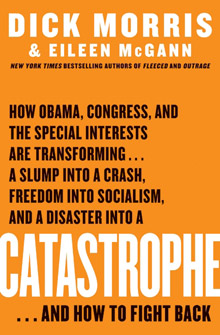
Dick Morris and Eileen McGann,Catastrophe
384 pages, Harper, June 23, 2009
Highest Position Reached on NYT Best Seller List: No. 1 (2 weeks)
Readability: 5
Digestibility: 7
Crazy Factor: -1
Overall Score: 11
Dick Morris, unlike most of the other authors of 2009's top-selling conservative books, has actually seen the inner workings of the federal government, and worked alongside its top officials — even Democrats. This seems to have left him with a nagging sense of reality about things, which constrains him even as he tries to spout the same end-of-the-world apocrypha as the others. He's like the grown-up playing Candy Land with the kids — he's going through the same motions, but you can tell he knows it's just a game.
So, even though Morris and his wife Eileen McGann let loose, for instance, in a rip-roaring introduction that accuses Barack Obama of wanting "an end of freedom and the dawn of socialism," the bulk of the book is far more pedantic.
On the economy, once you get past a little bombast about Obama's supposedly socialistic bank-rescue plans (which were still in flux as of Morris's writing — no need to wait until the guy's been president for a while before criticizing his administration), it turns out that the authors are mainly concerned that he will move forward without first laying out new regulatory frameworks.
Even more striking is the chapter devoted to "Obama's Health Care Catastrophe." Morris and McGann have no problem with the details of health-care reform — including a strong public-option (which had not become controversial at the time they assembled their book). Their problem is that it will take time for the pipeline of medical professionals to meet the new needs of a fully insured populace.
Still, if you ignore the hyperbolic interjections, Morris and McGann maintain a pretty good pace through the first half of the book. They make some reasonable points, and they actually understand, and do a fair job explaining, our current economic crisis.
Not that the analysis in Catastrophe is any good, mind you. They use a lot of data misleadingly, and sometimes just wrong mathematically. They also have some strange sympathies, such as their concern for "the politically impotent rich." And time has been unkind to most of their predictions — like the one about Obama's secret plan for TARP to fail so that he can nationalize the banks.
Nor does the hobgoblin of consistency bother Morris and McGann. On one page, they state that Obama and congressional Democrats "follow instructions from their corporate patrons" — and on literally the very next page, they accuse Obama of inciting class warfare against those same fat cats. They marvel that Obama's radical program was laid out in plain detail during the presidential campaign — and then write that Obama "camouflaged . . . the essential radicalism of his agenda" during that campaign.
Writing so early in the Obama administration, they can squeeze out only 142 pages on the evils his administration portends. The second half of the book becomes a Malkin-esque airing of grievances against an increasingly peripheral cast of political characters: Chris Dodd, Charles Rangel, Ted Kennedy Jr., Tom Daschle, George Mitchell, and others. By the section on Matthew Nugen (national political director for Obama's campaign), it's pretty clear that the wheels have come off the project.